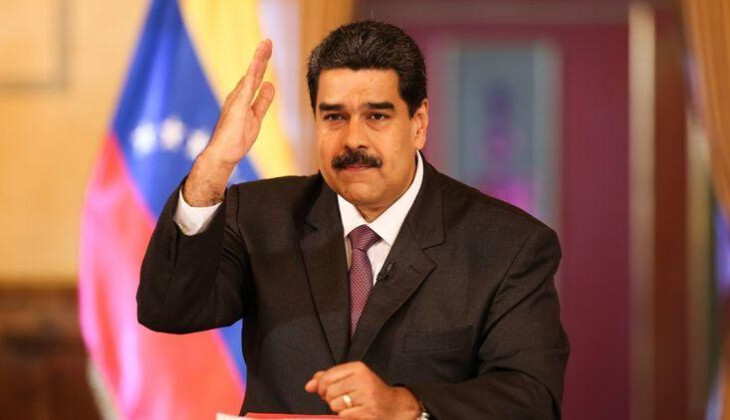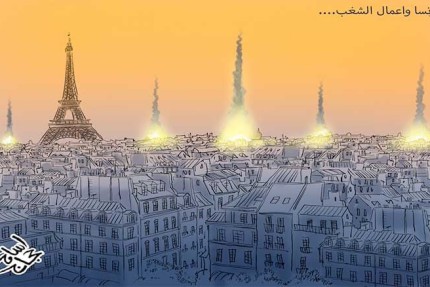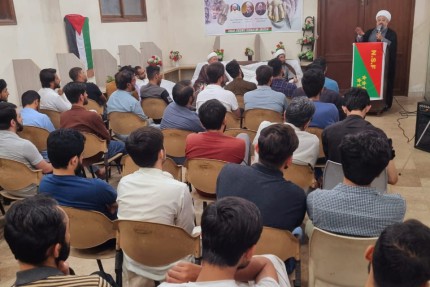Venezuela, Iran share goal of fighting colonialism, imperialism

Venezuela’s President Nicolas Maduro speaks in an exclusive interview with Iran's Spanish-language television channel, Hispan TV, in Tehran, on June 10, 2022.
Venezuelan President Nicolas Maduro says Venezuela and Iran have a common goal of fighting colonialism and imperialism across the globe.
Maduro, who arrived in Tehran on Friday at the head of a high-ranking politico-economic delegation, made the remarks in an exclusive interview with Iran’s Spanish-language television channel Hispan TV.
Venezuela and Iran are on the frontline of shaping a world free of imperialism and dominant powers, Maduro said.
The era of the United States’ military dominance in the world is over, the Venezuelan president stated.
Venezuela and Iran should share knowledge in all fields to create a new world, Maduro said, stressing that humanity is transitioning and a new geopolitical system would be established in the world.
Venezuela and Iran, two countries united by a common vision regarding international issues and victims of coercive measures by the United States and its allies, have had diplomatic ties for more than 60 years. But mutual relations became strategic with the arrival of the late commander Hugo Chavez to power in Venezuela in 1999.
On the international scene, specifically on the conflict in Ukraine, the Venezuelan head of state said “we are living through a time of geopolitical transition that will define the destiny of the 21st century.”
It is a century of the decline of hegemonic power and Iran and Venezuela are on the forefront of this process, Maduro said. The comprehensive map of cooperation is the spearhead towards achievement of a new world, the president stated.
Maduro: Iran courageously defied US sanctions
The president hailed Iran’s courageous move to send fuel tankers to his energy-hungry nation, saying Tehran’s delivery of oil to Caracas was a great help to the Venezuelan people.
Iran sent fuel to Venezuela despite US sanctions and threats, Maduro stated.
Iran and Venezuela have managed to withstand economic pressure from the United States, and have closely cooperated to offset the impact of illegal sanctions, particularly those targeting their energy sectors.
Iran has supplied fuel shipments and equipment needed in crude refineries to Venezuela in the face of US pressure on the country’s shipping and trade services. Venezuela has also received major shipments of condensate, a diluent of heavy oil, from Iran.
Oil industry analysts said in January that Venezuela had doubled its oil production thanks to Iran’s help in defiance of US sanctions against Caracas.
The Venezuelan oil production reached an estimated average of 900,000 barrels per day (bpd) in December and could reach 850,000 bpd in January, oil industry sources told the Miami Herald.
Within the framework of the Tehran-Caracas strategic alliance, Iran sent five tankers loaded with 1.53 million barrels of gasoline and additives to Venezuela in May 2020 to supply the South American nation, mired in severe fuel shortages, as a result of sanctions.
Venezuela doubles oil output despite US bans thanks to Iran’s help
Venezuela doubles oil output despite US bans thanks to Iran’s help
Venezuela has doubled its oil production over the past months thanks to Iran
Venezuelan oil experts confirmed the significant growth in the country’s production, underlining that the Iranian naphtha is essential for the government in Caracas to be able to sell crude from the Orinoco Oil Belt, which needs to be diluted to be sold on world markets.
‘Venezuela after closer cooperation with Iran’
Elsewhere in his interview, President Maduro said Venezuela and Iran have enjoyed brotherly ties for decades, reiterating his country’s resolve to seek closer cooperation with Tehran.
He said Caracas and Tehran have revolutionary backgrounds and they have always supported one another in hard times.
Maduro also stated that the two countries are working to expand cooperation in the tourism sector and establish direct flights between Caracas and Tehran.
He said Venezuela welcomes and invites investments from Iran, noting that a delegation, which is currently accompanying him, aims to find ways to improve relations.
Venezuela and Iran would open a new era in mutual relations, Maduro stated.
He said many companies are willing to work in Venezuela, which by itself vindicates the fact that resisting the US sanctions will eventually bear fruit.
Vigilance against war of sanctions
The Venezuelan president also highlighted the need to well inform the Iranian and Venezuelan nations about the war of sanctions and find ways to counter them with steadfastness.
Maduro said Caracas and Tehran have shaped the strategy of resistance economy and are working to expand it. He said the incorporation of people in the two governments’ efforts is among their key strategies to counter sanctions.
‘Palestine; humanity’s most sacred cause’
The Venezuelan president described Palestine as the most sacred cause of humanity. Maduro said the history of Palestine is admirable since people with different religions have lived there in peace.
Maduro censured the international community for remaining silent on the Israeli regime’s atrocities against the Palestinian people, emphasizing that Venezuela and Iran would continue to support the Palestinian struggle against the Israeli occupation.
HispanTV plays great role against Western media
Maduro praised the great role of HispanTV against the hegemonic media of the West and said that in the info war that imperialism has waged against alternative channels like HispanTV, the winner will undoubtedly be the independent media.
He underscored the importance of showing the truth in a professional way, saying he believes that HispanTV is now stronger than before despite sanctions against Iran.
Regarding freedom of expression, Maduro said the hegemonic media “cannot silence us. The times to come are going to be better times for everything.”
Comment
- Behind the Scene of the Attack in Oman, Operating Schemes that Intend to Destabilize the Country
- Trump’s Assassination Was a Ridiculous and Pre-organized Drama
- The Syrian senior analyst Views Towards the Letter of Iran’s President -Elect to the Secretary General of Hezbollah of Lebanon
- The hard way to political agreement in France/ Will Macron remain in power?
- Navigating the Caspian: Energy, Trade, and Geopolitical Harmony
- Behind the Scene of the Attack in Oman, Operating Schemes that Intend to Destabilize the Country
- Trump’s Assassination Was a Ridiculous and Pre-organized Drama
- The Syrian senior analyst Views Towards the Letter of Iran’s President -Elect to the Secretary General of Hezbollah of Lebanon
- The hard way to political agreement in France/ Will Macron remain in power?
- Navigating the Caspian: Energy, Trade, and Geopolitical Harmony
- Holding Public Court in Damascus to Put the Zionist Regime on Trial
- Boycotting Israeli Athletes for the Olympics in France Is Indispensable
- Iraqi Media Activists Arrested in Saudi Arabia/ Using the Hajj pilgrimage for settlement with the opponents
- Syrian Journalist and Author Tabib Ahmad Al-Darzi’s Analysis on Ali Bagheri’s Trip to Syria
- What Does it Mean on the Verge of Collapse and Has Israel Reached This Stage
- We Stand in an Era of Fundamental Changes/the World’s Political Literature is Changing
- The Art of Soft Power: How Khomeini and Khamenei Used Words to Transform the World
- Mey Sobhi Khansa’s views towards the Hague court verdict and the martyrdom of I R Iran president
- Behind the Scene of the Attack in Oman, Operating Schemes that Intend to Destabilize the Country
- Trump’s Assassination Was a Ridiculous and Pre-organized Drama
- The Syrian senior analyst Views Towards the Letter of Iran’s President -Elect to the Secretary General of Hezbollah of Lebanon
- The hard way to political agreement in France/ Will Macron remain in power?
- Navigating the Caspian: Energy, Trade, and Geopolitical Harmony
- Holding Public Court in Damascus to Put the Zionist Regime on Trial
- Boycotting Israeli Athletes for the Olympics in France Is Indispensable
- Iraqi Media Activists Arrested in Saudi Arabia/ Using the Hajj pilgrimage for settlement with the opponents
- Syrian Journalist and Author Tabib Ahmad Al-Darzi’s Analysis on Ali Bagheri’s Trip to Syria
- What Does it Mean on the Verge of Collapse and Has Israel Reached This Stage




